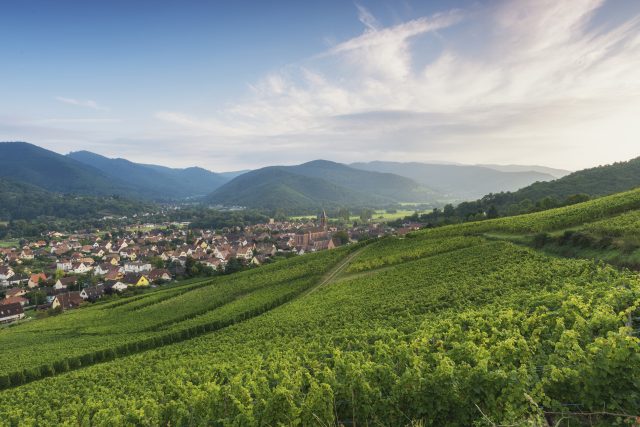Alsace winemaker issues ‘Saving Private Riesling’ petition
By Louis ThomasPierre Gassmann of Alsace’s Domaine Rolly Gassmann has released a petition to “protect” the diversity of the region’s Rieslings against the “normative frenzy” of proposed labelling changes.

Gassmann issued to petitions, one aimed at winemakers and the other at the general public. The latter begins: “I’m sorry to hear from our Alsace wine suppliers that they want to ban the diversity of Alsatian Rieslings: soon the word ‘Riesling’ will be forbidden on the labels of wines containing more than 4 grams of sugar per litre. This is an aberration, and I am opposed to this iniquitous decision.”
The decision Gassmann refers to was published in the Journal Officiel République Française Lois et Décrets (often abbreviated to JORF) from 1 August this year, after being voted on by a general meeting of L’Association des Viticulteurs d’Alsace last year. The Syndicate of Independent Winegrowers of Alsace (SYNVIRA), which claims 438 producer members, was largely opposed to the proposals.
“…this project will make the labelling of wines made from the Riesling grape variety less legible,” Gassmann continued, “which is the last straw from our point of view as consumers, connoisseurs and/or prescribers. In fact, there is a market for these ‘demi-sec’, ‘moelleux’ and ‘doux’ wines. They are not going to disappear by magic, and their new labelling system will considerably complicate the reading of the offer…”
“The elegance of these ‘demi-sec’, ‘moelleux’ and ‘doux’ types of Riesling, which nevertheless exalt their terroir, must be defended against this normative frenzy and standardisation that directs identity and quality downwards.”
“These wines, made from ripe grapes grown mainly in limestone, clay-limestone, marl-limestone, marl-limestone-sandstone and clay soils, account for three-quarters of Alsace’s vineyards. They are a rarity in the world and give Alsace a unique character that is recognised and envied the world over. On the other hand, we note that its strict application will make it impossible to produce Rieslings in sunny vintages in the best terroirs of the vineyard, due to global warming.”
Partner Content
Gassmann went on to condemn winemakers who have expressed support for this scheme: “It would also be absurd and incomprehensible to deny Alsace’s history with a stroke of the pen to please certain producers who do not represent, on their own, the living soul of the Alsatian vineyards we dream of.”
According to data from Le Conseil Interprofessionnel des Vins d’Alsace (CIVA), Riesling, as of 2019, is the second most-planted grape variety in the region, with 3,302 hectares devoted to it as opposed to Pinot Blanc’s 3,356ha.
In the petition addressed to winemakers, Gassmann wrote: “I vehemently contest the representativeness of those who, at ODG [Organisme de Défense et de Gestion] level who initiated this trend. They do not represent the plurality opinions of Alsatian producers and only serve industrial interests…”
Domaine Rolly Gassmann, situated near the village of Rorschwihr, was founded in its current form in 1967 by Marie-Therese Rolly and Louis Gassmann, with Pierre, their son, managing it today. The Gassmann family has been making wine in the area since the 17th century.
“In my view, Riesling is one of Alsace’s king grape varieties, and it is inconceivable that it should be deprived of its head, arms and legs…Because the greatest Alsatian Rieslings are not always dry, I ask you to cancel this decree and, failing that, to modify this regression in the AOC Alsace and Alsace Grand Cru Cahiers des Charges, so that the excellence of Alsace wines can continue,” concluded Gassmann in the petition for the general public.
Gassmann’s petition to support non-dry Riesling being allowed to be called Riesling is already gaining traction. Writing on wine news site Les 5 du Vin, Hervé Lalau found more holes in the proposed changes. He pointed out that singling out Riesling for labelling changes over other varieties is a flawed idea, and argued: “As a professional taster, I would also point out that sweetness is a very relative thing, because its perception depends on many other factors, first and foremost acidity.”
Related news
The 'family spirit' behind Champagne Gardet's 130th anniversary
Will white wine be central to Burgundy's future success in Asia?
How to make top blanc de blancs in 'the kingdom of Pinot Noir'




